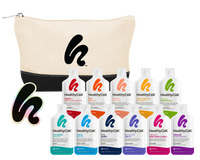Dry mouth or xerostomia affects 1 in 5 adults. It can cripple your quality of life when you’re not salivating enough, with symptoms including mouth sores, dry or tingly tongue and throat, cracked lips, burning sensations and lack of taste.
Many people searching for the cause of dry mouth find a little known term called “xerostomia.” But I’m not into medical labels, or temporary fixes like oral rinses and sprays, chewing gum or drinking more water. I’m into identifying the common underlying nutritional problem of dry mouth and offering a solution to treat the root cause.
Read on for more details about dry mouth, how you can alleviate it, and how your nutrition plays a pivotal part.
Why Do I Have Dry Mouth?
It’s a hard truth, but as we get older our bodies don’t work like they used to. Along with the back pain and not being able to sleep without a bathroom break, our salivary glands can start to slow down, leaving our mouths under-lubricated.
Dry mouth can be caused by a variety of factors besides simply getting older.
A list of known causes includes stress, anxiety, disease, medications, dehydration, nerve damage, unhealthy habits such as smoking, and even radiation therapy. Dry mouth can also be due to certain health conditions, such as diabetes, stroke, yeast infection (thrush), and candida overgrowth.[3,4]
Nutrition Tips for Managing Dry Mouth
One of the little-known culprits of dry mouth is a nutritional deficiency. One study found that 50 out of 67 people with xerostomia were also deficient in certain nutrients, including protein, fiber, and other vitamins and minerals.[1]
If you’re suffering from the symptoms of dry mouth, it’s possible you may be deficient in one or more vitamins or minerals. Are you wondering which vitamins you might be lacking can cause dry mouth? Take a closer look at your diet and determine if you’re lacking in any of these essential micronutrients that have been found in people with dry mouth:[4]
- Vitamin A - This vitamin for dry mouth helps keep your salivary glands functioning properly. Vitamin A is also beneficial for the enamel on your teeth and swallowing muscles.
- B Vitamins (thiamin, riboflavin, niacin, vitamin B6, and vitamin B12) - These vitamins promote a healthy mucosal membrane to protect from mouth sores, as well as tongue swelling, tingling, and pain. Vitamin B12 deficiency can also be a cause of bad breath!
- Zinc - Zinc is a mineral that assists with adequate saliva production and can help prevent dental cavities and other oral issues.
- Iron - This mineral is beneficial for skin health and helps prevent your lips and tongue tissue from cracking.
You can make sure you get enough of these nutrients by taking a dietary supplement.
Why Regular Vitamin Supplements Don’t Work
Dry mouth can make it very uncomfortable to swallow vitamin pills, and even cause a choking hazard. What’s worse is that you can’t absorb most of the nutrients in tablet form. What’s the point of taking a nutrition supplement if you can’t absorb the nutrients it contains?
You could take a liquid, but there are cons of taking liquid vitamins as well. The best solution is to take a MICROGEL. The soothing, cooling experience of a MICROGEL that’s easy to swallow and tastes great gives you maximum absorption while reducing the likelihood of dry mouth vitamin deficiency.
Microgel Vitamin Supplements
Absorption of nutrients is the most important factor when considering a supplement for dry mouth. Pills and powders have an industry standard of 20-30% absorption, therefore products that use MICROGEL technology are your best bet for maximum absorption. This new delivery system allows you to fully absorb active nutrients into your bloodstream and then into your cells, where they work to improve health and keep your mouth salivating.
The market-leading MICROGEL multivitamin is called Bioactive Multi by Healthycell. It’s a synergistic blend of essential vitamins and minerals, plus phytonutrients, botanical antioxidants, prebiotics and other nutrients in highly bioavailable forms for anyone seeking optimal health.
--
Dr. Vincent Giampapa, MD, FACS
Visiting Scholar, The Sinclair Lab
Harvard University, Boston, MA
Cell Aging Researcher & Author
Director, Cell Health Institute
Disclaimer: Seek medical attention for a proper diagnosis and treatment if you believe you are experiencing dry mouth or any of the related side effects.
References
[1] Rhodus, N L, and J Brown. “The Association of Xerostomia and Inadequate Intake in Older Adults.” Journal of the American Dietetic Association, U.S. National Library of Medicine, Dec. 1990, www.ncbi.nlm.nih.gov/pubmed/2131338.
[2] “Dry Mouth: Causes, Symptoms and Diagnosis.” Healthline, Healthline Media, www.healthline.com/symptom/dry-mouth.
[3] “Dry Mouth: Causes, Risks, and Treatments.” WebMD, WebMD, 10 Mar. 2019, www.webmd.com/oral-health/guide/dental-health-dry-mouth#1.
[4] “Dry Mouth and Vitamin Deficiency.” LIVESTRONG.COM, Leaf Group, www.livestrong.com/article/431693-dry-mouth-and-vitamin-deficiency/.




